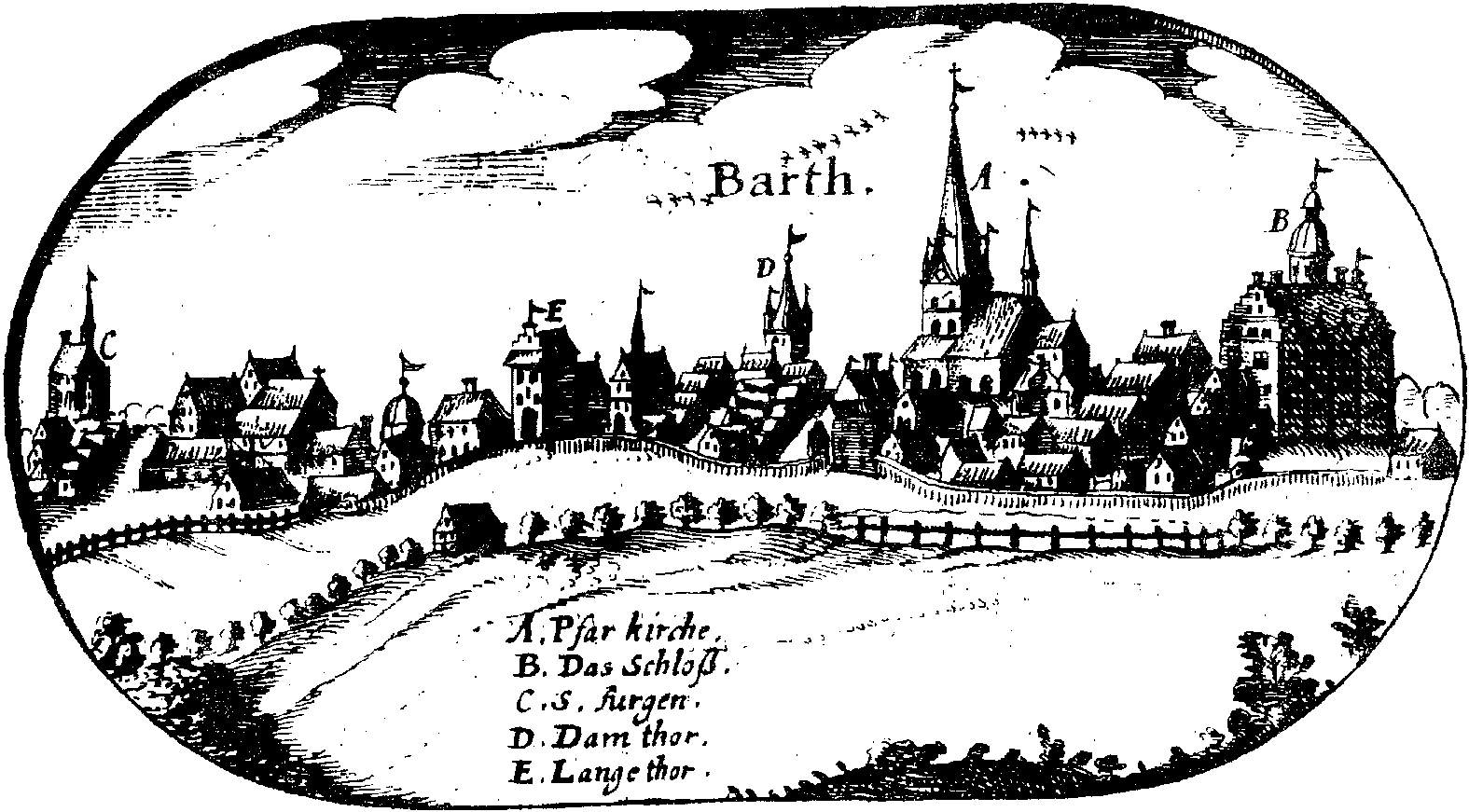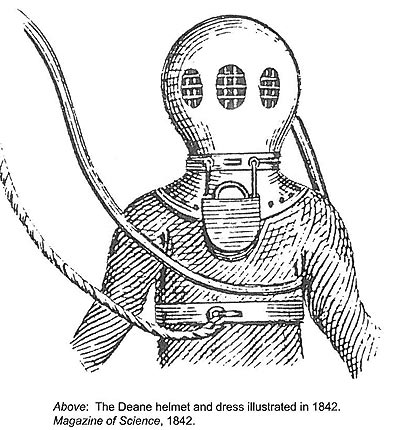|
Peter Kreeft (diver)
Peter Kreeft (born 1739 in Wieck auf dem Darß died January 20, 1811, in Barth) also spelled Kraeft or Kreft, was a German sea captain, shipping correspondent, ship owner and merchant in Barth, Germany, Barth, Swedish Pomerania, who invented an early version of a surface-supplied diving suit with helmet. Life and work The invention of the Surface-supplied diving equipment, surface supplied helmet diving suit was a major development in underwater diving. A document from 1805 found by the diving historian Michael Jung (historian), Michael Jung in 1996 shows that the shipowner and captain Peter Kreeft had significant influence on the development of the diving helmet with his invention of a ''Tauchermaschine'' [diving machine] in 1800. The document describes the invention of diving equipment, which was already close to the standard diving dress, and which was successfully used in the Baltic Sea. Kreeft also anticipated other developments, such as a Diver communications#Voice communica ... [...More Info...] [...Related Items...] OR: [Wikipedia] [Google] [Baidu] |
Wieck Auf Dem Darß
Wieck auf dem Darß is a Municipalities of Germany, municipality in the Vorpommern-Rügen district, in Mecklenburg-Vorpommern, Germany. Geography Wieck is situated at the southern shore of the peninsula Darß at the coastal lagoon (Low German: Bodden), between Born, Mecklenburg-Vorpommern, Born and the Baltic seaside resort Prerow. History For centuries, Wieck belonged to the Duchy of Pomerania and became Swedish after the Thirty Years' War. After Napoleon, Wieck became in 1815 Pomeranian again. After World War II, it was part of the district of Ribnitz-Damgarten. Wieck now belongs to the federal state of Mecklenburg-Vorpommern. Places of interest *Wieck Harbour *Typical small thatched cottages *Information centre of the national park with a huge exhibition *Galleries with works of local artists Landscape The Darß is part of the former islands Fischland, Darß and Zingst. The peninsula is part of the Western Pomerania Lagoon Area National Park. The surrounding of Wieck is fam ... [...More Info...] [...Related Items...] OR: [Wikipedia] [Google] [Baidu] |
Barth, Germany
Barth is a town in Mecklenburg-Vorpommern, Germany. It is situated at a lagoon (Bodden) of the Baltic Sea facing the Fischland-Darss-Zingst peninsula. Barth belongs to the district of Vorpommern-Rügen. It is close to the Western Pomerania Lagoon Area National Park. In 2011, it held a population of 8,706. History Barth dates back to the medieval German Ostsiedlung, before which the area was settled by Wends of the Liuticians or Rani tribe. Jaromar II, Danish prince of Rügen, granted the town Lübeck law in 1255. In the same document, he agreed to remove his burgh, ''Borgwall'' or ''Neue Burg'', then on the northwestern edge of the town's projected limits. Another Wendish burgh, ''Alte Burg'' near today's train station, was not used anymore. The German town was set up on empty space between the burghs. Not a member of the Hanseatic League, the town never grew to the importance and size of neighboring Hanseatic towns like Stralsund. The last prince of Rügen, Witzlaw III ... [...More Info...] [...Related Items...] OR: [Wikipedia] [Google] [Baidu] |
Swedish Pomerania
Swedish Pomerania ( sv, Svenska Pommern; german: Schwedisch-Pommern) was a dominion under the Swedish Crown from 1630 to 1815 on what is now the Baltic coast of Germany and Poland. Following the Polish War and the Thirty Years' War, Sweden held extensive control over the lands on the southern Baltic coast, including Pomerania and parts of Livonia and Prussia (''dominium maris baltici''). Sweden, which had been present in Pomerania with a garrison at Stralsund since 1628, gained effective control of the Duchy of Pomerania with the Treaty of Stettin in 1630. At the Peace of Westphalia in 1648 and the Treaty of Stettin in 1653, Sweden received Western Pomerania (German ''Vorpommern''), with the islands of Rügen, Usedom, and Wolin, and a strip of Farther Pomerania (''Hinterpommern''). The peace treaties were negotiated while the Swedish queen Christina was a minor, and the Swedish Empire was governed by members of the high aristocracy. As a consequence, Pomerania was not anne ... [...More Info...] [...Related Items...] OR: [Wikipedia] [Google] [Baidu] |
Kreeft Taucher
Peter John Kreeft (; born March 16, 1937) is a professor of philosophy at Boston College and The King's College. A convert to Roman Catholicism, he is the author of over eighty books on Christian philosophy, theology and apologetics. He also formulated, together with Ronald K. Tacelli, ''Twenty Arguments for the Existence of God'' in their ''Handbook of Christian Apologetics''. Academic career Kreeft was born March 16, 1937, in Paterson, New Jersey, the son of John and Lucy Kreeft. He took his AB at Calvin College (1959) and an MA at Fordham University (1961). He completed his doctoral studies in 1965, also at Fordham where he completed a dissertation under the direction of W. Norris Clarke. He subsequently completed his post-graduate studies at Yale University. Kreeft joined the philosophy faculty of the Department of Philosophy of Boston College in 1965. He has debated several academics in issues related to God's existence. Shortly after he began teaching at Boston Colle ... [...More Info...] [...Related Items...] OR: [Wikipedia] [Google] [Baidu] |
Surface-supplied Diving Equipment
Surface-supplied diving is diving using equipment supplied with breathing gas using a diver's umbilical from the surface, either from the shore or from a diving support vessel, sometimes indirectly via a diving bell. This is different from scuba diving, where the diver's breathing equipment is completely self-contained and there is no link to the surface. The primary advantages of conventional surface supplied diving are lower risk of drowning and considerably larger breathing gas supply than scuba, allowing longer working periods and safer decompression. Disadvantages are the absolute limitation on diver mobility imposed by the length of the umbilical, encumbrance by the umbilical, and high logistical and equipment costs compared with scuba. The disadvantages restrict use of this mode of diving to applications where the diver operates within a small area, which is common in commercial diving work. The copper helmeted free-flow standard diving dress is the version which made com ... [...More Info...] [...Related Items...] OR: [Wikipedia] [Google] [Baidu] |
Michael Jung (historian) (born 1947), Professor of Chemistry at the University of California
{{Hndis, Jung, Michael ...
Michael Jung may refer to: * Michael Jung (equestrian) (born 1982), German equestrian * Michael E. Jung Michael E. Jung is a Professor of Chemistry in the Department of Chemistry and Biochemistry at the University of California at Los Angeles. Michael Jung was born May 14, 1947 in New Orleans, Louisiana. Early life and education Jung received a B. ... [...More Info...] [...Related Items...] OR: [Wikipedia] [Google] [Baidu] |
Standard Diving Dress
Standard diving dress, also known as hard-hat or copper hat equipment, deep sea diving suit or heavy gear, is a type of diving suit that was formerly used for all relatively deep underwater work that required more than breath-hold duration, which included marine salvage, civil engineering, pearl shell diving and other commercial diving work, and similar naval diving applications. Standard diving dress has largely been superseded by lighter and more comfortable equipment. Standard diving dress consists of a diving helmet made from copper and brass or bronze, clamped over a watertight gasket to a waterproofed canvas suit, an air hose from a surface-supplied manually operated pump or low pressure breathing air compressor, a diving knife, and weights to counteract buoyancy, generally on the chest, back and shoes. Later models were equipped with a diver's telephone for voice communications with the surface. The term ''deep sea diving'' was used to distinguish diving with this equi ... [...More Info...] [...Related Items...] OR: [Wikipedia] [Google] [Baidu] |
Diver Communications
Diver communications are the methods used by divers to communicate with each other or with surface members of the dive team. In professional diving, diver communication is usually between a single working diver and the diving supervisor at the surface control point. This is considered important both for managing the diving work, and as a safety measure for monitoring the condition of the diver. The traditional method of communication was by line signals, but this has been superseded by voice communication, and line signals are now used in emergencies when voice communications have failed. Surface supplied divers often carry a closed circuit video camera on the helmet which allows the surface team to see what the diver is doing and to be involved in inspection tasks. This can also be used to transmit hand signals to the surface if voice communications fails. Underwater slates may be used to write text messages which can be shown to other divers, and there are some dive computers wh ... [...More Info...] [...Related Items...] OR: [Wikipedia] [Google] [Baidu] |
Rostock
Rostock (), officially the Hanseatic and University City of Rostock (german: link=no, Hanse- und Universitätsstadt Rostock), is the largest city in the German state of Mecklenburg-Vorpommern and lies in the Mecklenburgian part of the state, close to the border with Pomerania. With around 208,000 inhabitants, it is the third-largest city on the German Baltic coast after Kiel and Lübeck, the eighth-largest city in the area of former East Germany, as well as the 39th-largest city of Germany. Rostock was the largest coastal and most important port city in East Germany. Rostock stands on the estuary of the River Warnow into the Bay of Mecklenburg of the Baltic Sea. The city stretches for about along the river. The river flows into the sea in the very north of the city, between the boroughs of Warnemünde and Hohe Düne. The city center lies further upstream, in the very south of the city. Most of Rostock's inhabitants live on the western side of the Warnow; the area east of th ... [...More Info...] [...Related Items...] OR: [Wikipedia] [Google] [Baidu] |
Prerow
Prerow is a municipality in the district of Vorpommern-Rügen in the German state of Mecklenburg-Vorpommern. This Baltic seaside resort on the Darß peninsula is located about halfway between the historic Hanseatic towns of Rostock and Stralsund. It is one of three main settlements on the Darß, the others being the villages of Born and Wieck. Prerow has fine, sandy beaches and a picturesque landscape. It is hard to say where the forest ends and the village begins. The primeval Darß Forest has over 50 km of footpaths and cycle ways, a bridleway and tracks for horse-drawn carriages. West of the forest is West Beach with rugged terrain formed by wind and waves. South of Prerow is the ''bodden'' countryside. Visitors can take trips on a steam paddle boat and experience wildlife first-hand, nesting areas and various birds as the seasons change. The seaside resort of Prerow is located within the Western Pomerania Lagoon Area National Park which stretches from Ahrenshoop along t ... [...More Info...] [...Related Items...] OR: [Wikipedia] [Google] [Baidu] |
Gustav IV Adolf
Gustav IV Adolf or Gustav IV Adolph (1 November 1778 – 7 February 1837) was King of Sweden from 1792 until he was deposed in a coup in 1809. He was also the last Swedish monarch to be the ruler of Finland. The occupation of Finland in 1808–09 by Russian forces was the immediate cause of Gustav's violent overthrow by officers of his own army. Following his abdication on 29 March 1809, an Instrument of Government was hastily written, which severely circumscribed the powers of the monarchy. The "Instrument" was adopted in 1809 on 6 June, the National Day of Sweden now as well as in his time. It remained in force until replaced in 1974. The crown, now with strictly limited powers, passed to Gustav's uncle Charles XIII, who had no legitimate children; this want of heirs set into motion the quest for a successor, who was found the following year in the person of Jean-Baptiste Jules Bernadotte, the first monarch of the present royal family. ch 37 pp 203-19 Early life Gustav Adolf wa ... [...More Info...] [...Related Items...] OR: [Wikipedia] [Google] [Baidu] |
Stralsund
Stralsund (; Swedish: ''Strålsund''), officially the Hanseatic City of Stralsund (German: ''Hansestadt Stralsund''), is the fifth-largest city in the northeastern German federal state of Mecklenburg-Western Pomerania after Rostock, Schwerin, Neubrandenburg and Greifswald, and the second-largest city in the Pomeranian part of the state. It is located at the southern coast of the Strelasund, a sound of the Baltic Sea separating the island of Rügen from the Pomeranian mainland.'' Britannica Online Encyclopedia'', "Stralsund" (city), 2007, webpageEB-Stralsund The Strelasund Crossing with its two bridges and several ferry services connects Stralsund with Rügen, the largest island of Germany and Pomerania. The Western Pomeranian city is the seat of the Vorpommern-Rügen district and, together with Greifswald, Stralsund forms one of four high-level urban centres of the region. The city's name as well as that of the Strelasund are compounds of the Slavic ( Polabian) ''stral'' and ''s ... [...More Info...] [...Related Items...] OR: [Wikipedia] [Google] [Baidu] |






